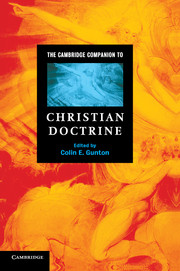Book contents
- Frontmatter
- Part one Christian doctrine in the late twentieth century
- 1 Historical and systematic theology
- 2 On doctrine and ethics
- 3 The basis and authority of doctrine
- 4 The scope of hermeneutics
- 5 Christ and the cultures: The Jewish people and Christian theology
- 6 Christ and the cultures: Christianity and the arts
- Part two The content of Christian doctrine
- 7 The triune God
- 8 The doctrine of creation
- 9 Human being, individual and social
- 10 Redemption and fall
- 11 The church and the sacraments
- 12 Eschatology
- 13 Jesus Christ
- 14 The Holy Spirit
- General index
- Index of biblical references
14 - The Holy Spirit
Published online by Cambridge University Press: 28 May 2006
- Frontmatter
- Part one Christian doctrine in the late twentieth century
- 1 Historical and systematic theology
- 2 On doctrine and ethics
- 3 The basis and authority of doctrine
- 4 The scope of hermeneutics
- 5 Christ and the cultures: The Jewish people and Christian theology
- 6 Christ and the cultures: Christianity and the arts
- Part two The content of Christian doctrine
- 7 The triune God
- 8 The doctrine of creation
- 9 Human being, individual and social
- 10 Redemption and fall
- 11 The church and the sacraments
- 12 Eschatology
- 13 Jesus Christ
- 14 The Holy Spirit
- General index
- Index of biblical references
Summary
God as such is spirit, holy in himself and transcending matter of which he is the Creator. In a graphic way, and in the geopolitical context of the late eighth century BC, the Old Testament prophet brings out the transcendence of the Holy One of Israel over both equine and human creatures, showing the Lord's righteous rule over what he has made: the Egyptians are 'men, and not God', and their horses are 'flesh, and not spirit', and when the Lord stretches out his hand, they will perish together with those who have sought help from them rather than from 'the Holy One of Israel' (Isaiah 31:1-3). Or in the words of Jesus in John's Gospel (4:24): 'God is spirit, and those who worship him must worship in spirit and truth.' Yet beside this more general connection of God with spirit and holiness, the Holy Spirit is the particular name of the third person of the Blessed Trinity, Father, Son and Holy Spirit. The explanation of this apparently ambivalent usage - God as holy spirit, and God the Holy Spirit - requires a historical account of the biblical and patristic developments that will already set us on the road of a more systematic exposition of pneumatological doctrine. Our procedure, therefore, will first be to retrace the self-revelation of God and the corresponding experience, practice and cognitive process of Israel and the early church.
- Type
- Chapter
- Information
- The Cambridge Companion to Christian Doctrine , pp. 273 - 296Publisher: Cambridge University PressPrint publication year: 1997
- 3
- Cited by

